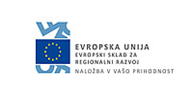| Next Generation of Cancer Gene Therapy: From Genes to Production and Clinics (2018-2021) |
| Head: | Acad. Prof. Gregor Serša, Ljubljana Institute of Oncology, Ljubljana, Slovenia |
| Partners: | Ljubljana Institute of Oncology Iskra pio d.o.o. Jafral d.o.o. Centre of Excellence for Biosensors, Instrumentation and Process Control University of Ljubljana, Faculty of Electrical Engineering |
| Funding: | European Regional Development Fund (ERDF) and the Slovenian Ministry of Education, Science and Sport |
| Code: | Smartgene.si |
![]()

![]()
The research project is funded by the European Union, namely the European Regional Development Fund (ERDF) and the Slovenian Ministry of Education, Science and Sport.
- Member of University of Ljubljana
- Code
- Smartgene.si
- Project
- Next Generation of Cancer Gene Therapy: From Genes to Production and Clinics
- Period
- 1.7.2018 - 30.6.2021
- Amount of financing
- 2.46 FTE
- Head
Acad. Prof. Gregor Serša
Head of Project at University of Ljubljana, Faculty of Electrical Engineering: Assist. Prof. Matej Reberšek
- Research activity
- Health-medicine - Treatment of cancer
- Research Organisation
Institute of Oncology Ljubljana
Iskra pio d.o.o.
Jafral d.o.o.
Center odličnosti za biosenzoriko, instrumentacijo in procesno kontrolo (COBIK)
Univerza v Ljubljani, Fakulteta za elektrotehniko- Abstract
Gene therapy is a therapeutic strategy that uses genes instead of drugs. The main goal of this therapy is to insert a functional gene into the target cell, which will play the role of a drug. The gene is inserted into cells in the form of vectors such as viruses or plasmid DNA. To insert plasmid DNA into target cells, electroporation is an often-used method to achieve this goal. In order to be approved for gene therapy applications in humans, plasmid DNA has to be produced in Escherichia coli bacteria in accordance with the regulations of Good Manufacturing Practice (GMP). Therefore, gene therapy begins with choosing the therapeutic gene and inserting the gene into the vector, followed by production of a vector containing the therapeutic gene and insertion of the vector into the patient. Before experiments on humans can be performed, therapeutic genes and vectors must be tested on cells in vitro and on animals in vivo. The project SmartGene.Si will carry innovative, globally useful solutions for gene therapy and focus on the challenges starting from the therapeutic gene and production of a vector to application and delivery to patients.
- Researchers
Not available or applicable for this project. For more information, visit the www.smartgene.si website.
- The phases of the project and their realization
Not available or applicable for this project. For more information, visit the www.smartgene.si website.
- Citations for bibliographic records
Not available or applicable for this project. For more information, visit the www.smartgene.si website.